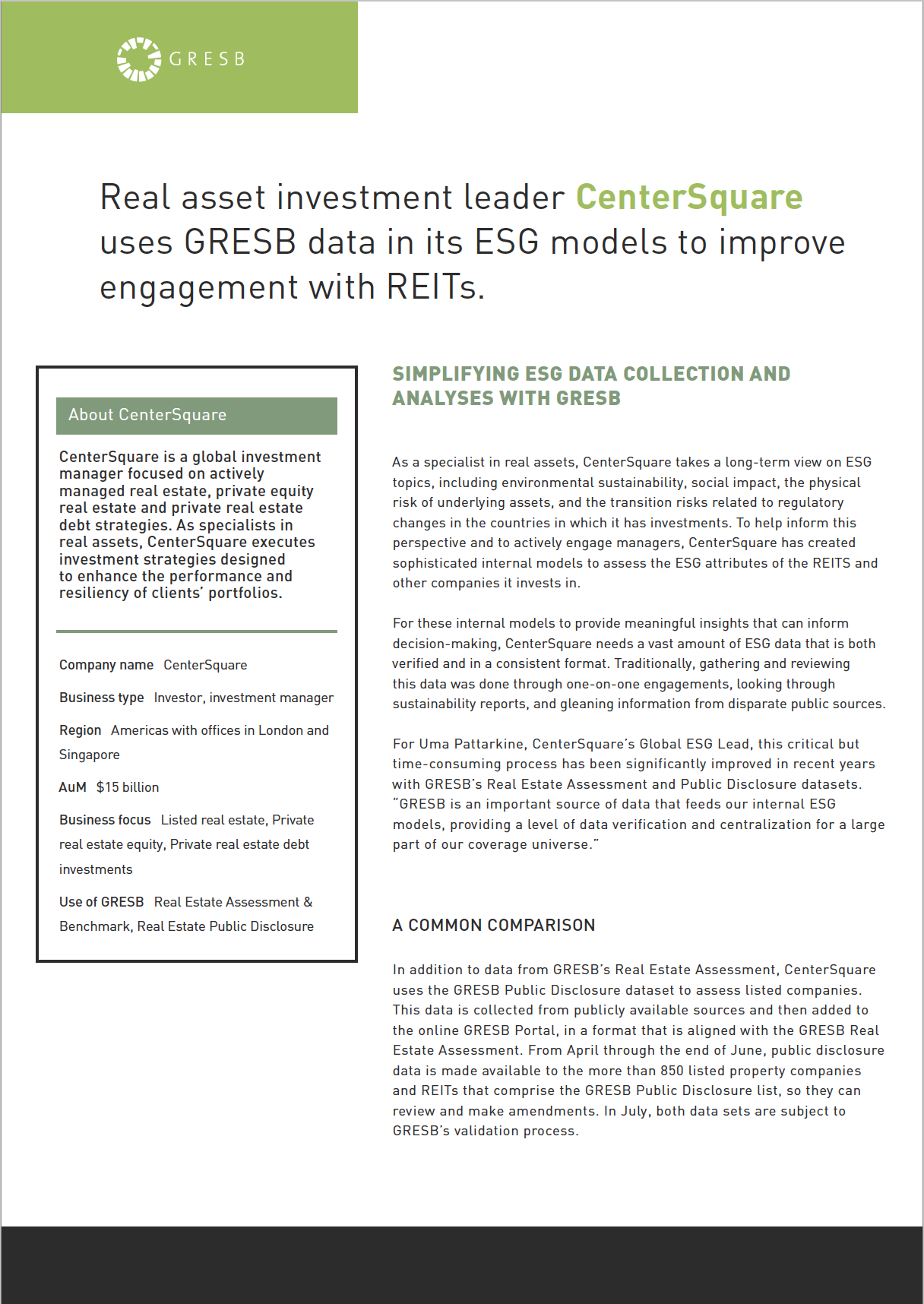Real asset investment leader CenterSquare uses GRESB data in its ESG models to improve engagement with REITs

CenterSquare is a global investment manager focused on actively managed real estate, private equity real estate and private real estate debt strategies. As specialists in real assets, CenterSquare executes investment strategies designed to enhance the performance and resiliency of clients’ portfolios.
Business type: Investor
Region: Americas with offices in London and Singapore
AuM: $15 billion
Business focus: listed real estate, private real estate equity, private real estate debt investments
Use of GRESB: Real Estate Assessment & Benchmark, Public Disclosure
Simplifying ESG data collection and analyses with GRESB
As a specialist in real assets, CenterSquare takes a long-term view on ESG topics, including environmental sustainability, social impact, the physical risk of underlying assets, and the transition risks related to regulatory changes in the countries in which it has investments. To help inform this perspective and to actively engage managers, CenterSquare has created sophisticated internal models to assess the ESG attributes of the REITs and other companies it invests in.
For these internal models to provide meaningful insights that can inform decision-making, CenterSquare needs a vast amount of ESG data that is both verified and in a consistent format. Traditionally, gathering and reviewing this data was done through one-on-one engagements, looking through sustainability reports, and gleaning information from disparate public sources.
For Uma Pattarkine, CenterSquare’s Global ESG Lead, this critical but time-consuming process has been significantly improved in recent years with GRESB’s Real Estate Assessment and Public Disclosure datasets. “GRESB is an important source of data that feeds our internal ESG models, providing a level of data verification and centralization for a large part of our coverage universe.”
A common comparison
In addition to data from GRESB’s Real Estate Assessment, CenterSquare uses the GRESB Public Disclosure dataset to assess listed companies. This data is collected from publicly available sources and then added to the online GRESB Portal, in a format that is aligned with the GRESB Real Estate Assessment. From April through the end of June, public disclosure data is made available to the more than 850 listed property companies and REITs that comprise the GRESB Public Disclosure list, so they can review and make amendments. In July, both data sets are subject to GRESB’s validation process.
Using GRESB data means a significant percentage of CenterSquare’s ESG data gathering and validation needs are already met and in a consistent format. “Being able to compare apples to apples across companies is really important,” said Uma. “Being able to look at all of this through GRESB has been very helpful.”
Engaging REITs with standardized data
As part of its investment strategy, CenterSquare actively engages with its managers across the board, using GRESB Scores and other insights drawn from its ESG models.
“As we engage with GRESB Sector Leaders, we try to understand the strategies they are deploying across their portfolios and best practices to share with others in the sector,” said Uma. “And for all companies, we look at changes in scores and KPIs year-over-year to understand the progress being made, which is made easier when using standardized GRESB Scores, so analysts don’t have to dig through data points for each company, every year.”
Many REITs – particularly smaller ones that don’t provide data to GRESB – have a strong focus on sustainability and are doing great things, but their efforts don’t always get reflected in the data provided to investors. This is often because their focus on ESG comes from the top, but not enough resources are allocated to capture and measure their performance.
This is why engagement is crucial. It helps ensure that ESG data is provided and that it can be properly reviewed over time in a way that is aligned with investors’ interests. As part of its engagement process, CenterSquare supports REITs to start collecting the right ESG data so they can be recognized for their efforts. Once resources to capture this data are allocated, most REITs that are new to ESG benchmarking like GRESB are able to put together a solid baseline in just a couple of years.
Looking forward to more granular asset-level data
While Uma’s team still gathers ESG data the traditional way for some smaller REITs that don’t participate in GRESB, perspectives across the industry are changing. “For years, I was living a Sisyphean nightmare, always pushing the ESG boulder up the hill,” she said. “Now, however, I believe we are at the cusp, with companies truly understanding the importance of ESG data and knowing that this is something they should do.”
As industry perspectives evolve, so do investors’ needs. Like many organizations, CenterSquare will be looking for more granular data in the near future. “Decarbonization, net zero, and science-based targets are becoming much more important,” said Uma. “For that, you just have to have asset-level data.”
Getting started
Listed REITs that are interested in collecting ESG data and making it available to investors can learn more at gresb.com/manager.